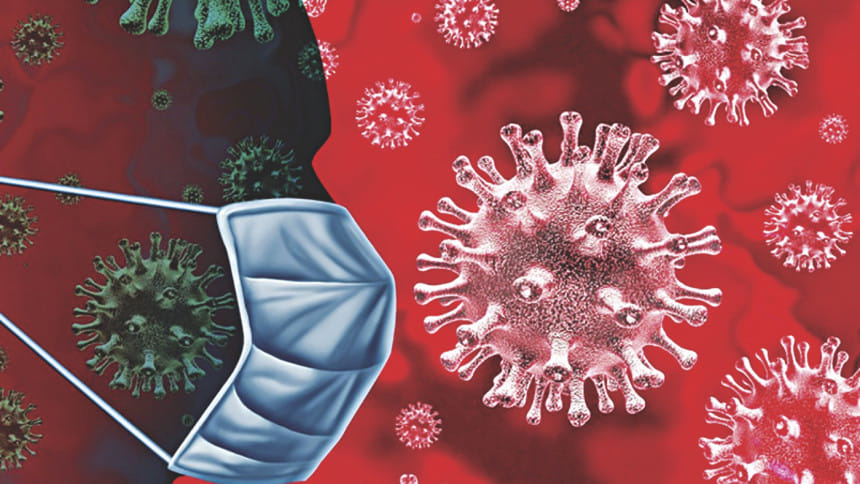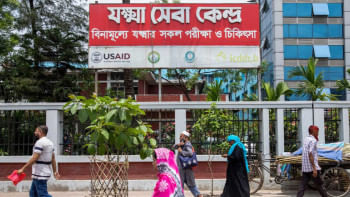Be My Quarantine: Some random thoughts on Covid-19 isolation

Too little money, too much screen time, and uneven distribution of household chores and childcare—a recipe made in hell. Covid-19 is the novel source of love's labour's lost. It used to be "infidelity", but now "domestic conflict" is being touted as the prime cause for divorces in China. There has been a whopping 25 percent increase in the number of divorces following the government-mandated lockdowns. Familiality, it seems, is breeding contempt. Many couples are fighting over trivial things, not knowing how to negotiate for their own share of time and space in a shared relationship. The rate of domestic violence too has shot up. And officials in China, according to a Bloomberg BusinessWeek report, are struggling to cope with the onrush of divorce applications. In Hunan, "staff members didn't even have time to drink water" as they dealt with cases of separation.
The rest of the world is catching up. "After just over a week of the official order for UK families to stay indoors, nine people have been killed at home in Britain. Sadly, the death toll will not end there," writes Barbara McCarthy in an op-ed for RT, quoting a domestic abuse victim, who said, "The lockdown is hard for everyone, but if you're a victim of abuse, it's hell. You get no downtime."
Women are the most likely victims of domestic violence, especially in a system that boasts patriarchy. A Malaysian health ministry directives failed to hide its gender bias in one of its illustrated leaflets designed for women in quarantine. "If you see your husband carry out a task in a manner that clashes with your own method, avoid nagging," the image reads. The leaflet also advised women to "mimic the tone of Doraemon"– a robotic cat from a popular Japanese manga—and maintain a shy, submissive attitude and "feminine" laugh.
Just months into the crisis, our social fabric is showing signs of wear and tear. What does it tell us about humans, the paragon of animals that take their vantage position in the evolutionary schema for granted? The myth of social relations has been punctured by the tiniest of micro-organisms, while asocial behaviours are becoming viral (excuse my pun). The insularity promoted at both individual and official levels is melting down the hide of civility, and the animal self is coming to the fore. The animal that knows just one law: survival of the self. Be fit enough to survive. Doctors in Italy have the tough choice of being the jury and executioner to judge who is fit enough to contribute to society for some more time. They have to decide the recipient of a ventilator, and ponder whether patients over the age of 80 should be allowed to live or die.
The crisis is testing our humanity everywhere. In some cases, the animals that we carry inside surface like the werewolves under a full moon howling at the edge of the forest. Sometimes, they can take the shape of a customer spitting on the fruits in a supermarket or a businessman hoarding stocks hoping to profit in near future. For long, we humans have established the myth of taming the jungle. The adventures of a white boy in Africa (Tarzan) or a brown boy in India (Mowgli) tell the tales of human triumphs over nature. Civilisation has taught us how to exploit physical nature in order to replenish human nature (including spirituality), build human institutions (including marriage), and pursue growth (including economic development). However, there have been many moments of crisis in history that reminded us of the ills of such transgressions.
Novel coronavirus is an atrophy of a similar human/animal transgression/transaction. It is a disease that has been transmitted from wildlife to humans. Kate Jones, the chair of ecology and biodiversity at UCL, reminds us of the hidden cost of human economic development. "There are just so many more of us, in every environment. We are going into largely undisturbed places and being exposed more and more. We are creating habitats where viruses are transmitted more easily, and then we are surprised that we have new ones," Jones said.
In our insulated isolation, we suddenly wake up to a new reality. Our circles are being redefined. Some external force-field is restricting our limits. And there are internal ones, too. New prescriptions are given: work from home, bank from home, enter the cloud, play online, and the list goes on. As we are forced to enter the cauldron of our own, the individual bubbles clash with one another, and burst. The divorces are symptomatic of the daily soap opera.
Then again, these domestic disturbances are just the tip of the iceberg. What lies beneath is a whole burden of uncertainties that await us. On the surface, we fight over little things, but deep down there are disturbances of a different sort. The immediate uncertainty, of course, implicates our physical health. We are afraid of being contaminated. We are anxious. If the virus is allowed to take its natural course, it will reign for the next two years affecting 60-70 percent of the world population, leaving millions dead in the process. The next uncertainty involves our economic health: put bluntly, what will happen if we run out of our money? Can we think of a state without money? And of course, the above two affect our emotional state. The crisis, therefore, involves physical health, economic health and mental health.
So far, the crisis management has been done by the states. The sincerity, capability and resources of the state are being tested. Once they are exhausted or stretched, the real danger will come in sight. The rich/poor chasm will be bigger than ever. And these external factors will change our psychological makeup forever. Many radical proposals are being considered. So far, most of them tend to highlight virtual experiences in place of the real: online teaching, online sports… everybody is saying "eeee" to pose for the dystopian snapshot.
The impossibility is here. The sci-fi movies are suddenly making sense. All these talks about the machines taking over or humanity changing its face are suddenly more real than fiction. We are no longer the supreme rational creatures who can logically and emotionally articulate the merits of humanism, and justify and explain how nature was created to serve us. We are suddenly faced with a new reality where our fate is enmeshed with the environment.
Salvoj Zizek, one of the most eminent cultural philosophers of our time, however thinks that the "biggest threat Covid-19 epidemic poses is not our regression to survivalist violence, but BARBARISM with human face." He warns us of a system that will monopolise the cure, while legitimising it with human sympathy and ideology. President Trump's offer of USD 1 billion to Tübingen-based biopharmaceutical company CureVac to secure the vaccine "only for the United States" is a case in point.
On a positive note, the isolation has allowed us to put matters into perspective. The rise of violence in a domestic space, for instance, goes on to show how toxic we have become, both for us and for others. Our withdrawal from our surrounding has allowed the quality of air to get better—fewer people are dying of respiratory diseases (irony, eh!). You can actually see the city sky as the shroud of pollution has been lifted. The birds are singing in the concrete jungle. The dolphins have returned to the beaches. At a time of separation, we have thoughts of union. We are reminded of the other species with whom we share the world. We are not the only inhabitants of the world whose worries should worry the lot.
It's about time we rethought what it means to be human. Having said that, I shall fail in my duty if I do not hail those heroes who are proving humanity on a daily basis. Our cleaning staff, our doctors and nurses, our security officials, our policy makers. The philanthropists, the scientists, the technicians, the food producers and suppliers who have come to the aid of others. They are the real heroes of humanity. Their fight, however, is one that is being fought outside. There is another battle that needs to be waged. It is inside. It can be fought while being in quarantine. A battle to ensure inner peace and stability by seeking a harmonious balance between man and man, man and nature, and nature and nature. By understanding who we are, and what our individual, social, and environmental purposes are in the grand scheme of things. We just need to look inside, and tell us: be my quarantine.
Shamsad Mortuza is a professor of English, University of Dhaka (now on leave). Currently, he is Pro-Vice-Chancellor of ULAB. Email: [email protected]

 For all latest news, follow The Daily Star's Google News channel.
For all latest news, follow The Daily Star's Google News channel. 



Comments